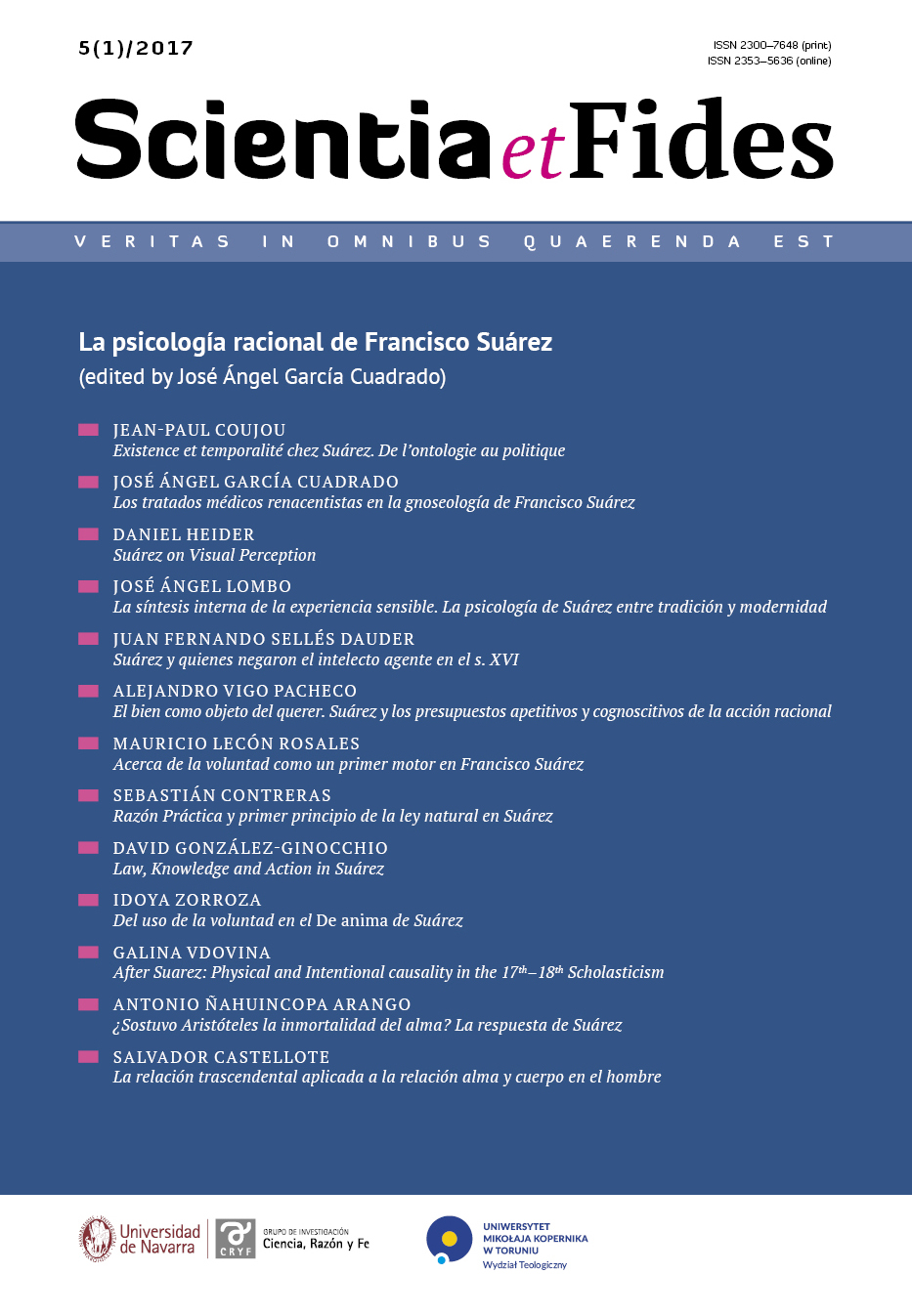La síntesis interna de la experiencia sensible. La psicología de Suárez y el origen de la neurociencia
Słowa kluczowe
Francis Suárez, Aristotle, theory of knowledge, inner senses, physiology of sensitive organs, neuroscienceAbstrakt
In the context of the great philosophical synthesis of Francis Suárez, between XVI and XVII centuries, his commentary to De Anima manifest the originality of his thought, between continuity and innovation in front of the big issues that Aristotle’s work had left open. His reflection on the problems of knowledge will open the path to a modern way of thinking, not exempt of some critical aspects. As he recognizes the active role of sensitive powers and he analyzes their physiological dimension, he will reduce inner sensitivity to only one power. The characterization of this only inner sense requires an adequate distinction of it as regards both external sensitivity and intellectual power, and implies some localization in the brain. Surarez’s dialogue with the physiology of his time places him at the historical beginning of neuroscience.
Bibliografia
Alarcón, E. 2014. “La dimensión modal del conocimiento.” Espíritu 63/148: 251-282.
Allers, R. 1941. “The vis cogitativa and Evaluation.” The New Scholasticism 15: 195–221.
Aristóteles. 1987. Acerca de la generación y la corrupción. Tratados breves de historia natural, edited by E. La Croce, A. Bernabé Pajares. Madrid: Gredos.
Barbado, M. 1946. Estudios de psicología experimental. Madrid: Consejo Superior de Investigaciones Científicas.
Byers, S. C. 2016. “Augustine’s debt to Stoicism in the Confessions.” In The Routledge Handbook of the Stoic Tradition, edited by J. Sellars, : 56-69. Oxford-New York: Routledge.
Beuchot, M. 1994. “La teoría de las distinciones en la Edad Media y su influjo en la Edad Moderna.” Revista Española de Filosofía Medieval 1: 37-48.
Black, D. L. 2000. “Imagination and Estimation: Arabic Paradigms and Western Transformations.” Topoi 19/1: 59–75.
Blanco, C. 2014. Historia de la neurociencia. El conocimiento del cerebro y la mente desde una perspectiva interdisciplinar, Madrid: Biblioteca Nueva.
Castellote, S. 1963. “Antropología filosófica en la obra de Francisco de Valles.” Archivo Iberamericano de Historia de la Medicina y Antropología Médica 15: 77-120.
De Haan, D. D. 2014. “Moral Perception and the Function of the Vis Cogitativa in Thomas Aquinas’s Doctrine of Antecedent and Consequent Passions.” Documenti e studi sulla tradizione filosofica medievale 25: 289-330.
Edwards, M., 2012. “Suárez in a Late Scholastic Context. Anatomy, Psychology, and Authority.” In The Philosophy of Francisco Suárez, edited by B. Hill & H. Lagerlund, 25-37. Oxford: Oxford University Press.
Fabro, C. 2008. Percezione e pensiero. Segni: EDIVI.
García Cuadrado, J. Á. 2015. “La armonía de facultades en la gnoseología de Francisco Suárez.” Pensamiento 71/267: 587–615.
Grabmann, M. 2006. “Naturaleza metodológica y actualidad de las «Disputaciones metafísicas» de Francisco Suárez.” Azafea 8: 149-179.
Jansen, R. 2005. Aquinas on the cogitative power and the generation of the sense appetite. Portland: The Catholic University of America.
Kemp, S. - Fletcher, G. J. O. 1993. “The Medieval Theory of the Inner Senses.” The American Journal of Psychology, 106/4: 559-576.
Knuuttila, S. 2014. “Suárez’s Psychology.”, In A Companion to Francisco Suárez, edited by V. Salas and R. Fastiggi, 192-220. Leiden-Boston: Brill.
Lavin, I. 1992. “Memoria e senso di sé. Sul ruolo della memoria nella teoria della psicologia dall'antichità a Giambattista Vico.” In La cultura della memoria, edited by L. Bolzoni-P. Corsi, 291-317 . Bologna: Il Mulino.
Leijenhorst, C. 2007. “Cajetan and Suarez on Agent Sense. Metaphysics and Epistemology in Late Aristotelian Thought.” In Forming the Mind. Essays on the Internal Senses and the Mind/Body Problem from Avicenna to the Medical Enlightenment, edited by H. Lagerlund, 237-262. Dordrecht: Kluwer.
Lombo, J. A. – Giménez Amaya, J. M. 2016. Biología y racionalidad: El carácter distintivo del cuerpo humano. Pamplona: EUNSA.
Madeira, J. 2009. “Francisco Valles Covarrubias: o galenismo renascentista depois de Andreas Vesalius.” Veritas (Porto Alegre) 54/3: 71-89.
Pereira, J. 2007. Suárez: Between Scholasticism and Modernity. Milwaukee (WI): Marquette University Press.
Piro, F. 2012. “E’ sufficiente un solo senso interno? La psicologia dell’immaginazione nella prima età moderna e le sue difficoltà.” Lo Sguardo - Rivista di Filosofia 10/3:183-197.
South, J. 2001. “Francisco Suárez on Imagination.” Vivarium 39/1: 119-158.
Suárez, F. 1978-1991 De Anima (Commentaria una cum quaestionibus in libros de Aristotelis De anima), edited by S. Castellote. Madrid: Labor-Sociedad de Estudios y Publicación.
Summers, D. 1987. The Judgment of Sense. Renaissance Naturalism and the Rise of Aesthetics. Cambridge: Cambridge University Press.
Tellkamp, J. A. 2012. “Albert the Great on structure and function of the inner senses.” In The Judeo-Christian-Islamic heritage. Philosophical and theological perspectives, edited by R. Taylor & I. Omar, 305-324. Milwaukee (WI): Marquette University Press.
Tomás de Aquino. 1959. In Aristotelis librum De anima, edited by A. M. Pirotta. Turín-Roma: Marietti.
Vallés, F. 1556. Controversiarum medicarum et philosophicarum, Alcalá: J. Brocar.
Vesalio, A. 1543. De humani corporis fabrica libri septem. Basilea: Ioannis Oporini.
Wolfson, H. A. 1935. “The Internal Senses in Latin, Arabic, and Hebrew Philosophic Texts.” The Harvard Theological Review 28/2: 69–133.
Pobrania
Opublikowane
Jak cytować
Numer
Dział
Licencja
CC BY ND 4.0. Posiadaczem prawa autorskiego (Licencjodawcą) jest Autor, który na mocy umowy licencyjnej udziela nieodpłatnie prawa do eksploatacji dzieła na polach wskazanych w umowie.
- Licencjodawca udziela Licencjobiorcy licencji niewyłącznej na korzystanie z Utworu/przedmiotu prawa pokrewnego w następujących polach eksploatacji: a) utrwalanie Utworu/przedmiotu prawa pokrewnego; b) reprodukowanie (zwielokrotnienie) Utworu/przedmiotu prawa pokrewnego drukiem i techniką cyfrową (e-book, audiobook); c) wprowadzania do obrotu egzemplarzy zwielokrotnionego Utworu/przedmiotu prawa pokrewnego; d) wprowadzenie Utworu/przedmiotu prawa pokrewnego do pamięci komputera; e) rozpowszechnianie utworu w wersji elektronicznej w formule open access na licencji Creative Commons (CC BY-ND 3.0) poprzez platformę cyfrową Wydawnictwa Naukowego UMK oraz repozytorium UMK.
- Korzystanie przez Licencjobiorcę z utrwalonego Utworu ww. polach nie jest ograniczone czasowo ilościowo i terytorialnie.
- Licencjodawca udziela Licencjobiorcy licencji do Utworu/przedmiotu prawa pokrewnego nieodpłatnie na czas nieokreślony
PEŁEN TEKST UMOWY LICENCYJNEJ >>
Statystyki
Liczba wyświetleń i pobrań: 1294
Liczba cytowań: 0



